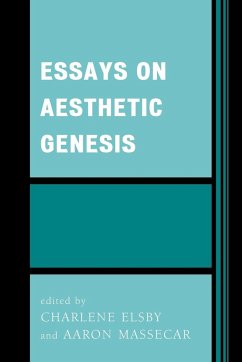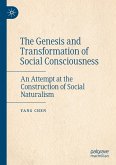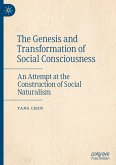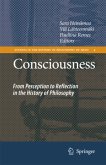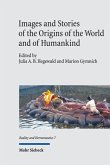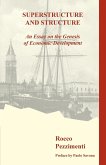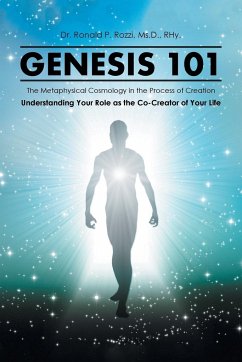Essays on Aesthetic Genesis
Herausgeber: Elsby, Charlene; Massecar, Aaron
Essays on Aesthetic Genesis
Herausgeber: Elsby, Charlene; Massecar, Aaron
- Broschiertes Buch
- Merkliste
- Auf die Merkliste
- Bewerten Bewerten
- Teilen
- Produkt teilen
- Produkterinnerung
- Produkterinnerung
This collection of essays takes as its focus Mitscherling’s comprehensive phenomenological analysis of embodiment, aesthetic experience, the interpretation of texts, moral behavior, and cognition, and exemplifies subsequent work in the field of realist phenomenology being conducted by an international collection of active scholars influenced by Mischerling’s Aesthetic Genesis.
Andere Kunden interessierten sich auch für
![The Genesis and Transformation of Social Consciousness The Genesis and Transformation of Social Consciousness]() Yang ChenThe Genesis and Transformation of Social Consciousness83,99 €
Yang ChenThe Genesis and Transformation of Social Consciousness83,99 €![The Genesis and Transformation of Social Consciousness The Genesis and Transformation of Social Consciousness]() Yang ChenThe Genesis and Transformation of Social Consciousness83,99 €
Yang ChenThe Genesis and Transformation of Social Consciousness83,99 €![Fascinated with Science Fascinated with Science]() Yufeng ZhaoFascinated with Science24,99 €
Yufeng ZhaoFascinated with Science24,99 €![Consciousness Consciousness]() Consciousness174,99 €
Consciousness174,99 €![Images and Stories of the Origins of the World and of Humankind Images and Stories of the Origins of the World and of Humankind]() Images and Stories of the Origins of the World and of Humankind129,00 €
Images and Stories of the Origins of the World and of Humankind129,00 €![Superstructure and Structure. An Essay on the Genesis of Economic Development Superstructure and Structure. An Essay on the Genesis of Economic Development]() Rocco PezzimentiSuperstructure and Structure. An Essay on the Genesis of Economic Development27,99 €
Rocco PezzimentiSuperstructure and Structure. An Essay on the Genesis of Economic Development27,99 €![Genesis 101 Genesis 101]() Ms. D. Rhy. RozziGenesis 10115,99 €
Ms. D. Rhy. RozziGenesis 10115,99 €-
-
-
This collection of essays takes as its focus Mitscherling’s comprehensive phenomenological analysis of embodiment, aesthetic experience, the interpretation of texts, moral behavior, and cognition, and exemplifies subsequent work in the field of realist phenomenology being conducted by an international collection of active scholars influenced by Mischerling’s Aesthetic Genesis.
Produktdetails
- Produktdetails
- Verlag: University Press of America
- Seitenzahl: 248
- Erscheinungstermin: 14. Juni 2016
- Englisch
- Abmessung: 229mm x 152mm x 15mm
- Gewicht: 408g
- ISBN-13: 9780761867692
- ISBN-10: 0761867694
- Artikelnr.: 44825732
- Herstellerkennzeichnung
- Libri GmbH
- Europaallee 1
- 36244 Bad Hersfeld
- gpsr@libri.de
- Verlag: University Press of America
- Seitenzahl: 248
- Erscheinungstermin: 14. Juni 2016
- Englisch
- Abmessung: 229mm x 152mm x 15mm
- Gewicht: 408g
- ISBN-13: 9780761867692
- ISBN-10: 0761867694
- Artikelnr.: 44825732
- Herstellerkennzeichnung
- Libri GmbH
- Europaallee 1
- 36244 Bad Hersfeld
- gpsr@libri.de
Charlene Elsby is an Assistant Professor of Philosophy at Indiana University-Purdue University, Fort Wayne, specializing in Ancient Philosophy and Realist Phenomenology. She has articles appearing in Quaestiones Disputatae and Logic and Logical Philosophy, along with several book chapters and contributions to popular culture and philosophy volumes. She is currently working on an analysis of the integration of Aristotelian concepts into the works of early phenomenologists. Aaron Massecar is an independent scholar and consultant living in Guelph, Canada. He is the author of Ethical Habits: A Peircean Perspective (Lexington Books, 2016) and numerous articles on Charles S. Peirce that have been published in journals such as The Transactions of the Charles S. Peirce Society and Contemporary Pragmatism. He continues to research critical, reflective habit development and its effect on human performance.
Foreword
Introduction
Charlene Elsby and Aaron Massecar
Major Concepts
1. On the Concept of Aesthetic Genesis
Charlene Elsby, Indiana University-Purdue University, Fort Wayne
2. The Copernican Turn of Intentional Being
Charles Rodger, University of Alberta
Historical Considerations
3. Cartesian Soul: Embodiment and Phenomenology in the Wake of Descartes
Felix ÓMurchadha, National University of Ireland, Galway and Ane Faugstad
Aarø, University of Bergen
4. The Intentional Being of Justice and the Foreseen
Kimberly Baltzer-Jaray, Wilfrid Laurier University
5. Mitscherling's Reading of Ingarden
Robert Luzecky, Indiana University-Purdue University, Fort Wayne
6. Being that Can be Understood is (Not Just) Language: On Linguisticality
and Intentionality
Jason C. Robinson, Wilfrid Laurier University
Contemporary Discussion
7. Overcoming Husserl's Mind-World Split: Jeff Mitscherling's Aesthetic
Genesis and the Birth of Consciousness Through Intentionality
Antonio Calcagno, King's University College
8. Artistic Creation: On Mitscherling and Dylan
Paul Fairfield, Queen's University
9. Our Connection to Nature
Siby K. George, Indian Institute of Technology, Bombay
10. Intentionality and the New Copernican Revolution: Realist Phenomenology
and the Extended Mind Hypothesis
Aaron Massecar, Independent Scholar
11. Perfect Empiricism: Mitscherling's Aristotelian Phenomenology, the
Logos, and The Problem of Ideal Objects
Conrad Hamilton, Université Paris VIII Saint-Denis
12. A Relational Theory of Truth
Joshua Boyce, University of Toronto
Afterword
The Problem with Being that Can be Understood
Jeff Mitscherling, University of Guelph
Introduction
Charlene Elsby and Aaron Massecar
Major Concepts
1. On the Concept of Aesthetic Genesis
Charlene Elsby, Indiana University-Purdue University, Fort Wayne
2. The Copernican Turn of Intentional Being
Charles Rodger, University of Alberta
Historical Considerations
3. Cartesian Soul: Embodiment and Phenomenology in the Wake of Descartes
Felix ÓMurchadha, National University of Ireland, Galway and Ane Faugstad
Aarø, University of Bergen
4. The Intentional Being of Justice and the Foreseen
Kimberly Baltzer-Jaray, Wilfrid Laurier University
5. Mitscherling's Reading of Ingarden
Robert Luzecky, Indiana University-Purdue University, Fort Wayne
6. Being that Can be Understood is (Not Just) Language: On Linguisticality
and Intentionality
Jason C. Robinson, Wilfrid Laurier University
Contemporary Discussion
7. Overcoming Husserl's Mind-World Split: Jeff Mitscherling's Aesthetic
Genesis and the Birth of Consciousness Through Intentionality
Antonio Calcagno, King's University College
8. Artistic Creation: On Mitscherling and Dylan
Paul Fairfield, Queen's University
9. Our Connection to Nature
Siby K. George, Indian Institute of Technology, Bombay
10. Intentionality and the New Copernican Revolution: Realist Phenomenology
and the Extended Mind Hypothesis
Aaron Massecar, Independent Scholar
11. Perfect Empiricism: Mitscherling's Aristotelian Phenomenology, the
Logos, and The Problem of Ideal Objects
Conrad Hamilton, Université Paris VIII Saint-Denis
12. A Relational Theory of Truth
Joshua Boyce, University of Toronto
Afterword
The Problem with Being that Can be Understood
Jeff Mitscherling, University of Guelph
Foreword
Introduction
Charlene Elsby and Aaron Massecar
Major Concepts
1. On the Concept of Aesthetic Genesis
Charlene Elsby, Indiana University-Purdue University, Fort Wayne
2. The Copernican Turn of Intentional Being
Charles Rodger, University of Alberta
Historical Considerations
3. Cartesian Soul: Embodiment and Phenomenology in the Wake of Descartes
Felix ÓMurchadha, National University of Ireland, Galway and Ane Faugstad
Aarø, University of Bergen
4. The Intentional Being of Justice and the Foreseen
Kimberly Baltzer-Jaray, Wilfrid Laurier University
5. Mitscherling's Reading of Ingarden
Robert Luzecky, Indiana University-Purdue University, Fort Wayne
6. Being that Can be Understood is (Not Just) Language: On Linguisticality
and Intentionality
Jason C. Robinson, Wilfrid Laurier University
Contemporary Discussion
7. Overcoming Husserl's Mind-World Split: Jeff Mitscherling's Aesthetic
Genesis and the Birth of Consciousness Through Intentionality
Antonio Calcagno, King's University College
8. Artistic Creation: On Mitscherling and Dylan
Paul Fairfield, Queen's University
9. Our Connection to Nature
Siby K. George, Indian Institute of Technology, Bombay
10. Intentionality and the New Copernican Revolution: Realist Phenomenology
and the Extended Mind Hypothesis
Aaron Massecar, Independent Scholar
11. Perfect Empiricism: Mitscherling's Aristotelian Phenomenology, the
Logos, and The Problem of Ideal Objects
Conrad Hamilton, Université Paris VIII Saint-Denis
12. A Relational Theory of Truth
Joshua Boyce, University of Toronto
Afterword
The Problem with Being that Can be Understood
Jeff Mitscherling, University of Guelph
Introduction
Charlene Elsby and Aaron Massecar
Major Concepts
1. On the Concept of Aesthetic Genesis
Charlene Elsby, Indiana University-Purdue University, Fort Wayne
2. The Copernican Turn of Intentional Being
Charles Rodger, University of Alberta
Historical Considerations
3. Cartesian Soul: Embodiment and Phenomenology in the Wake of Descartes
Felix ÓMurchadha, National University of Ireland, Galway and Ane Faugstad
Aarø, University of Bergen
4. The Intentional Being of Justice and the Foreseen
Kimberly Baltzer-Jaray, Wilfrid Laurier University
5. Mitscherling's Reading of Ingarden
Robert Luzecky, Indiana University-Purdue University, Fort Wayne
6. Being that Can be Understood is (Not Just) Language: On Linguisticality
and Intentionality
Jason C. Robinson, Wilfrid Laurier University
Contemporary Discussion
7. Overcoming Husserl's Mind-World Split: Jeff Mitscherling's Aesthetic
Genesis and the Birth of Consciousness Through Intentionality
Antonio Calcagno, King's University College
8. Artistic Creation: On Mitscherling and Dylan
Paul Fairfield, Queen's University
9. Our Connection to Nature
Siby K. George, Indian Institute of Technology, Bombay
10. Intentionality and the New Copernican Revolution: Realist Phenomenology
and the Extended Mind Hypothesis
Aaron Massecar, Independent Scholar
11. Perfect Empiricism: Mitscherling's Aristotelian Phenomenology, the
Logos, and The Problem of Ideal Objects
Conrad Hamilton, Université Paris VIII Saint-Denis
12. A Relational Theory of Truth
Joshua Boyce, University of Toronto
Afterword
The Problem with Being that Can be Understood
Jeff Mitscherling, University of Guelph

